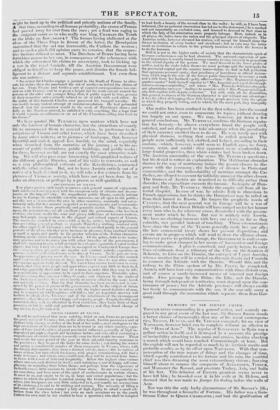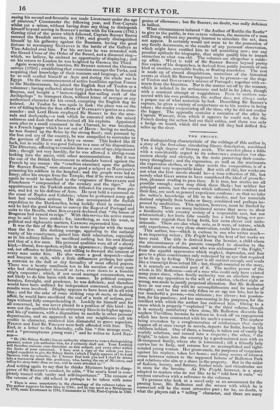MEMOIRS OF SIR SIDNEY SMITH.
THOV011 never commanding in a general action, and scarcely en- gaged in any great event of the last war, Sir SIDNEY SMITII stands a better chance of' immortality than any of his naval contempora- ries, NELSON, DUNCAN, 1111(1 Sc'. VINCENT (INCE`IMPII; for no view Of NAPOLEON, 110MTTer brief, can be complete without an allusion to the "Hero of Acre." The repulse of lios APAIITE ill Syria was a gallant action in itself, and it destroyed in a measure the prestige of invincibility attaching to his name and armies, besides checking a march which would have reached Constantinople at least. But the exploit will not be regarded so much by its intrinsic merits and probable results, as by its effect upon NAntr.i.oN. With that non- perception of the true nature of things and the changes of time, which equolly contributed to his fortune and his ruin, the youthful chief' was then dreaming the most extraordinary visions; fancying himself about to surpass the conquests of ALExaNnon, Tistoea, muuud MAHOMET the Second, and prostrate Turkey', Asia, and India at his feet. This delusion of Eastern grandeur seems never to have left him ; lie brooded over it in his exile at St. Helena, and deemed that he was made to forego his destiny before the walls of Acre.
Nor was this the only lucky circumstance of Sir SIDNEY'S life; lie was throughout a favourite of Fortune. His father was a Gen- tleman Usher to Queen Cusotoorro ; and had the gratircation of seeing bis second and favourite son made Lieutenant under the age of nineteen,* Commander the following year, and Post-Captain whilst yet a minor, without having done any thing to distinguish himself beyond serving in RODNEY'S action with DE GRASSE (1782.) Getting tired of the peace which followed, Captain SIDNEY SMITH entered the Swedish service, in 1788; and greatly distinguished himself by his gallantry against the Russians, having the good fortune to accompany GUSTAVUS in the battle of the Galleys as Vice-Admiral over him. For his services he was rewarded with the Grand Cross of the Order of the Sword, and a diamond ring— which, we believe, he omitted no opportunity of displaying ; and on his return to London he was knighted by GEORGE the Third. Again wearying with inaction, Sir SYDNEY entered the Ottoman service (1793) ; establishing that connexion amongst the Turks, and acquiring that knowledge of their manners and language, of which he so well availed himself at Acre and during the whole war in Egypt. On the commencement of active hostilities against France in the Mediterranean, he joined the English fleet off Toulon as a volunteer ; having collected about forty jack-tars whom he found at Smyrna, and bought a " latteen-rigged fast-sailing craft of the Archipelago" to transport them, without letter of marque or any authorized character for his vessel, excepting the English flag he hoisted. At Toulon he was again in luck : the place was on the eve of falling before the first efforts of NAPOLEON'S genius as a com- mander: and Lord Hoop employed Sir SIDNEY to fire the arse- nals and dockyards,—a task which he executed with the mixed calmness and dash that characterized all his exploits. Appointed soon after to a small command in the Channel, he was becalmed in a French lugger which he cut out of Havre: having no anchors, he was floated up the Seine by the strong flood ; and, pursued by the hue and cry of the country, he was compelled to surrender to the garrison of Havre and a levy en masse. This looked like ill luck, but in reality it was good fortune to a man of his dispositions. The Directory, affecting to consider him as a sort of spy, imprisoned him ; though not very harshly, for he was allowed a sitting-room looking into the street, with other accommodations. But it was the cue of the British Government to stimulate hatred against the French by any means : the "cruelties exercised upon the gallant Sir SIDNEY SMITH," were almost as good a subject as NAPOLEON'S poisoning his soldiers in the hospital ; and the people were led to fancy, after his escape from the Temple, that if he were ever taken again he would be sacrificed to the vengeance of Bosarsiers and Frenchmen "compounded of the monkey and the tiger." An appointment to the Turkish station followed his escape from pri- son, and led to his defence of Acre. Ile next held a command on the coast of Naples and Calabria; where be performed many gal- lant but resultless actions. He also accompanied the foolish expedition to the Dardanelles, being luckily third in command ; and he had the good fortune to convey the Regent of Portugal and suite to the Brazils, when BONAPARTE declared that "the house of Braganza had ceased to reign." With this service his active career may be said to have ended ; for, interfering, as was his wont, in political and diplomatic matters, CANNING superseded him. It was the fate of Sir SIDNEY to be more popular with the many than the few. His dashing courage, appealing to the national vanity of his countrymen, gained him their admiration, especially as in his solitary failure he sacrificed nothing but his own liberty and that of a few men. His personal qualities were all of a showy kind,—liberal, free-spoken, stylish in appearance; though egotisti- cal, not offensive to inferiors, and willing to forward the interest of every man under him. He also wrote a good despatch—clear and buoyant in style, with a little diffuseness perhaps, but quite a contrast to the dull or dry formality of most official papers. There was a hearty manliness too in his mention of every man who had distinguished himself at Acre, even down to a humble ship's carpenter; which, if not usual amongst commanders, was not likely to do him harm with the masses. In political compre- hension, foresight, and prudence, he was deficient; and therefore would have been unfitted for independent command, where great results were involved. Display appears to have been all in all with him; and for the sake of some striking coup de main, or dashing affair, he would have sacrificed the end of a train of actions, per- haps without fully comprehending it. Luckily for himself and for all concerned, he was never placed in a position of this kind : his were not the qualities which an aristocracy likes in its higher agents ; and his cif manners, with a disposition to meddle in other persons' departments, and an approach to what our neighbours call tete exaltee in character, rendered him distasteful to grave superiors. NELSON and Earl ST. VINCENT were both offended with him. The Earl, in a letter to the Admiralty, calls him "this strange man," and a "presumptuous young man ;" and he writes to Lord NEL.* SON- " He (Sir Sidney Smith) has no authority whatever to wear a distinguishing pennant, unless you authorize him, for / certainly shall not. Your Lordship will therefore exercise your discretion on this subject, and every other within the limits of your command. I have sent a copy of the orders you have judged expedient to give Sir Sidney Smith (which I highly approve of) to Lord Spencer, with my remarks; for 1 foresee that both you and I shall be drawn into a tracasserie about this gentleman, who, having the ear of Ministers, and telling his story better than we can, will he more attended to.'"
And writing again to say that he thinks Ministers begin to disap- prove of Sir SYDNEY'S conduct, he adds, "The man's head is com- pletely turned with vanity and self-importance." The censure of the veteran of the old school is perhaps to be taken with some
* There is some uncertainty in the chronology of the volumes before us. The author supposes his hero born in 1764; and he was rated as a Midshipman in 1776, made Lieutenant in 1781, Commander in 1782, Post-Captain in 1783.
grains of allowance ; but Sir SIDNEY, no doubt, was sadly deficient in ballast.
What circumstances induced "the Author of Rattlin the Reefer" to give to the public, in two octavo volumes, the memoirs of a man still living, without any passing interest to stimulate the act, does not appear. It certainly would not seem to be the possession of any family documents, or the results of any personal observation, which might have enabled him to tell something new ; nor any peculiar aptitude for biography, that might qualify him to impart attraction to what was old. The volumes are altogether a made- up affair. What is told of Sir SIDNEY SMITII beyond pretty free copies of his despatches, is derived from public journals of one kind or another, accessible books, or floating anecdotes. The rest is made up of absurd disquisitions, narratives of the historical events at which Sir SIDNEY happened to be present—as the siege of Toulon and BONAPARTE'S seizure of Portugal ; together with ex- tracts from the Gazettes. Nor is the matter set off by the manner, which is inflated in its seriousness and bald in its jokes, though with a constant attempt at waggishness. Even in matters con- nected with his own profession, the author does not always make a proper use of what materials be had. Describing Sir SIDNEY'S capture, he gives a variety of conjectures as to his motive in being taken ; the reader conjecturing all the time, why he did not anchor the lugger. The appendix contains a narrative of the affitir by Captain WRIGHT, *Om which it appears he could not, for the French during the action had cut their cables, and there was only a kedge on board, which did not hold till they had drifted five miles up the river.

































 Previous page
Previous page